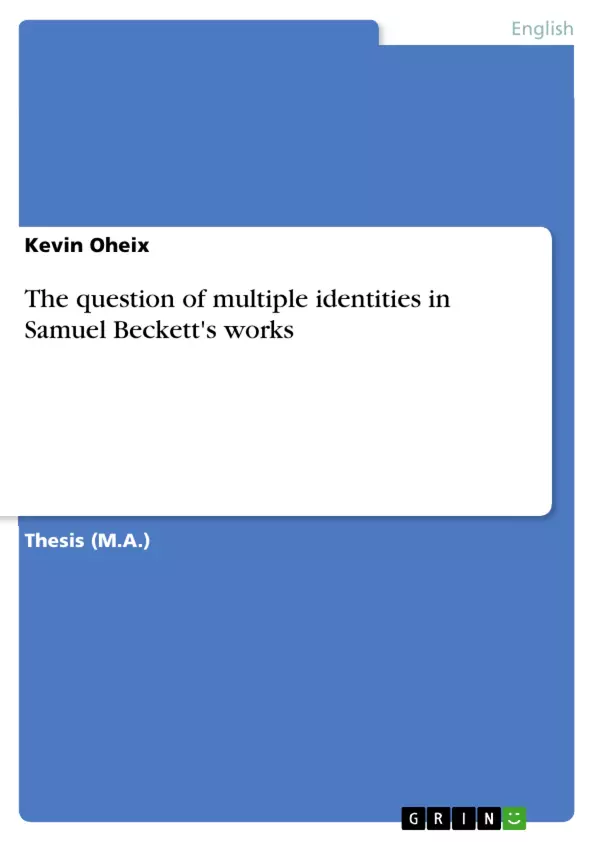Ce mémoire traite des identités plurielles et de l'entre-deux culturel dans les oeuvres de Samuel Beckett.
The void has been a great source of inspiration for Samuel Barclay Beckett and his
critics who tend to take into account the characteristics of his mind rather than his
writings. Such a deconstructionist discourse on negative identity is redundant but also
contradictory. This study aims at exploring the fundamental question of multiple
identities in Samuel Beckett's fictions and dramas, particularly The Unnamable from
the trilogy, Waiting for Godot, Endgame, Krapp's Last Tape and other relevant works.
As a novelist, playwright and translator, Beckett can be said to be part of a revolutionary
literature. His rejection and exploitation of the literary tradition make him an ambivalent
writer. The problem of singularity regarding his works is crucial in the stabilization of
identity. Moreover, the lack of a major theme becomes an obstacle to the definition of
such works. The representation of these multiple identities will be analyzed in order to
elucidate the following inquiry: To what extent does Beckett's texts shed light on the
seminal notions of rootlessness and cultural in-betweenness as well as on the rejection
of identification through self-exploration and radical experimentation? A certain number
of critical readings will be used to discuss Beckett's place in literature through his
characters' apparent lack of attachment to any tradition. Does literature have a function
in the formation of identity? What sort of renovation does the Beckettian texts offer? It
will be first noted that his borrowings from the French and Irish traditions coupled with
his aloofness to them are indicators of the complexity of his mode of communication
which is itself predicated on individual and conventional systems of discourse. By
means of exploring the essential antagonisms that departure and return represent, this
study will attempt to identify the literary forms of identity and apprehend the constant
redefinition of the self whose ambiguous nature have to be examined in the light of the
paradox between multiplicity and reduction.
How are marginalization and alterity experienced in the author's post-colonial writings?
Beckett's bilingual experience via the relationship between the man and his work will
complement this research. [...]
Inhaltsverzeichnis (Table of Contents)
- Introduction
- I) The Beckettian cosmos
- 1. Discarding the literary tradition
Zielsetzung und Themenschwerpunkte (Objectives and Key Themes)
This study explores the concept of multiple identities in Samuel Beckett's works, particularly focusing on the novels and plays The Unnamable, Waiting for Godot, Endgame, and Krapp's Last Tape. The aim is to examine how Beckett's texts shed light on rootlessness, cultural in-betweenness, and the rejection of identification through self-exploration and radical experimentation.
- The impact of Beckett's bilingual experience on his writing.
- Beckett's rejection and exploitation of the literary tradition.
- The role of repetition in the assertion of the protagonists' selfhood.
- The significance of marginalization and alterity in Beckett's works.
- The interrogation of the subject of writing and the problem of expression.
Zusammenfassung der Kapitel (Chapter Summaries)
The first chapter, "Discarding the literary tradition," examines Beckett's rejection of traditional literary forms and his creation of a new, unconventional mode of narration. It explores the relationship between technology, literature, and the human condition in Beckett's works, highlighting the influence of postmodernism and the rejection of modernist ideals. The chapter also discusses Beckett's use of the stream of consciousness technique, his rejection of psychologism, and the importance of self-reflexivity in his writing.
Schlüsselwörter (Keywords)
Samuel Beckett, multiple identities, literary tradition, postmodernism, stream of consciousness, self-reflexivity, marginalization, alterity, bilingualism, repetition, expression, subject of writing.
Frequently Asked Questions
What is the central theme of multiple identities in Beckett's work?
The study explores how Beckett's characters experience a lack of stable identity, often existing in a state of cultural in-betweenness and rootlessness.
How does Beckett's bilingualism affect his writing?
Writing in both French and English allowed Beckett to distance himself from traditional literary conventions and experiment with the limits of expression.
Why does Beckett discard traditional literary traditions?
He rejects modernist ideals and psychologism to create a "revolutionary literature" that focuses on the void and radical self-exploration.
Which specific works are analyzed in this study?
The study focuses on The Unnamable, Waiting for Godot, Endgame, and Krapp's Last Tape.
What is the "Beckettian cosmos"?
It refers to the unique, often desolate and repetitive world Beckett creates, where marginalization and alterity are central human experiences.
- Quote paper
- Kevin Oheix (Author), 2014, The question of multiple identities in Samuel Beckett's works, Munich, GRIN Verlag, https://www.grin.com/document/274823



